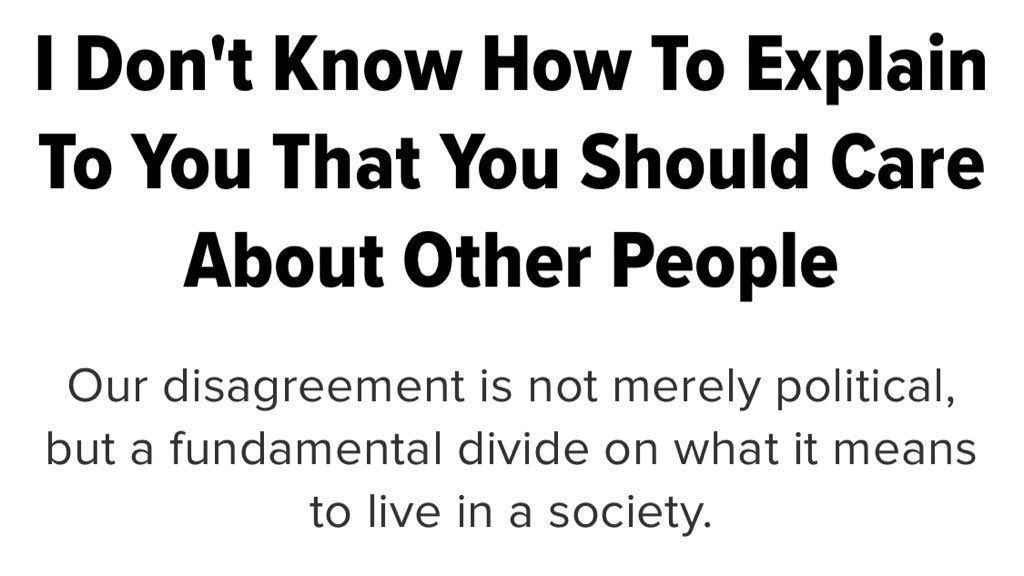I’m not sure I’ve ever seen anything on Twitter that hits the nail on the head more than this:
A lot of my disagreements with liberals or conservatives basically comes down to this pic.twitter.com/gAOuUIScHH
— Mac 🍽 (@GoodPoliticGuy) November 28, 2020
The question approaches that of psychopathy or sociopathy in which
People like this [with antisocial personality disorder] have a poor inner sense of right and wrong. They also can’t seem to understand or share another person’s feelings. . . . Someone with this personality type sees others as objects he can use for his own benefit.[1]
Indeed, this is another reason for regarding capitalism as criminal,[2] as this economic ideology inherently reduces some human beings to means to others’ (the rich and powerful) ends.[3]
This has real consequences. Consider, for example, a definition of structural violence I have often cited:
Structural violence usually has the effect of denying people important rights, such as economic well-being; social, political, and sexual equality; a sense of personal fulfillment and self-worth; and so on. When people starve to death, or even go hungry, a kind of violence is taking place. Similarly, when humans suffer from diseases that are preventable, when they are denied decent education, affordable housing, opportunities to work, play, raise a family, and freedom of expression and peaceful assembly, a kind of violence is occurring, even if no bullets are shot or clubs wielded. A society commits violence against its members when it forcibly stunts their development and undermines their well-being, whether because of religion, ethnicity, gender, age, sexual preference, or some other social reason. Structural violence is a serious form of social oppression. And it is regrettably widespread and often unacknowledged.[4]
People die from structural violence. Whether from a malady that could have been treated had health care been available, from starvation, from a lack of adequate housing, from shortened lives, or even stress. But structural violence only matters if 1) you personally experience it, or 2) other people matter.
And what I believe “Mac 🍽 ,” in the tweet I quoted above, is really getting to is that capitalists, whether as capitalist libertarians or neoliberals or their apologists, are in fact advocating structural violence against some human beings so that others may benefit. Capitalism fits the definition of antisocial personality disorder. It’s not that such people don’t have reasons or rationale for their behavior:
Lisa Bortolotti, in her book on irrationality, presents counter-examples of individuals living with mental disorders who apparently flourish. For instance, she cites . . . “successful psychopaths” (people who display the core traits of psychopathic personality but who are successful in life).[5]
It’s that some of us recognize the structural violence inherent to capitalism, recognize it as criminal,[6] and judge such reasoning to be antisocial.
For all of this, I’m still actually failing to answer the question. Because clearly for the rich and powerful, structural violence is okay and antisocial reasoning is okay. They embrace a logic that society at large, indeed humanity as a whole, exists to serve their purposes alone.[7]
“Mac 🍽 ” asks how to explain that this logic is wrong. Ethically, it obviously is. But as an answer, this presumes that ethics matters. For psychopaths and sociopaths, it doesn’t.
- [1]Kara Mayer Robinson, “Sociopath vs. Psychopath: What’s the Difference?” WebMD, 2014, https://www.webmd.com/mental-health/features/sociopath-psychopath-difference↩
- [2]David Benfell, “We are reaping what we have sown,” Not Housebroken, November 21, 2020, https://disunitedstates.org/2020/11/21/we-are-reaping-what-we-have-sown/↩
- [3]Lawrence M. Hinman, Contemporary Moral Issues, 4th ed. (Boston: Pearson, 2013).↩
- [4]David P. Barash and Charles P. Webel, Peace and Conflict Studies (Thousand Oaks, CA: Sage, 2002), 7.↩
- [5]Elly Vintiadis, “The Irrationality Within Us,” Scientific American, December 12, 2016, https://blogs.scientificamerican.com/mind-guest-blog/the-irrationality-within-us/↩
- [6]David Benfell, “We are reaping what we have sown,” Not Housebroken, November 21, 2020, https://disunitedstates.org/2020/11/21/we-are-reaping-what-we-have-sown/↩
- [7]This logic explicitly appears in the Tidewater sociocultural region that Colin Woodard describes in American Nations (New York: Penguin, 2011). I associate it with functionalist conservatism in my dissertation: David Benfell, “Conservative Views on Undocumented Migration” (doctoral dissertation, Saybrook, 2016). ProQuest (1765416126).↩

Pingback: We are reaping what we have sown – Not Housebroken
Pingback: Pennsylvania’s lunatic fringe is at it again – Irregular Bullshit